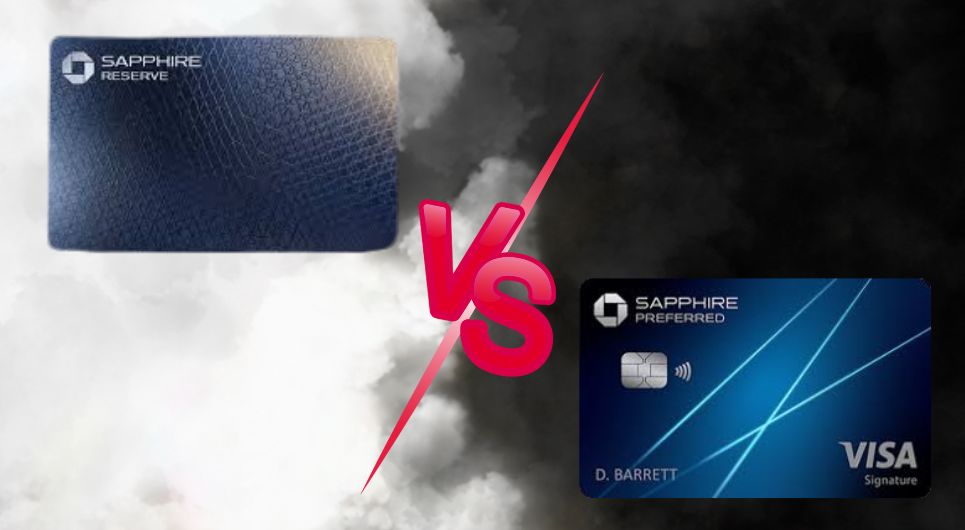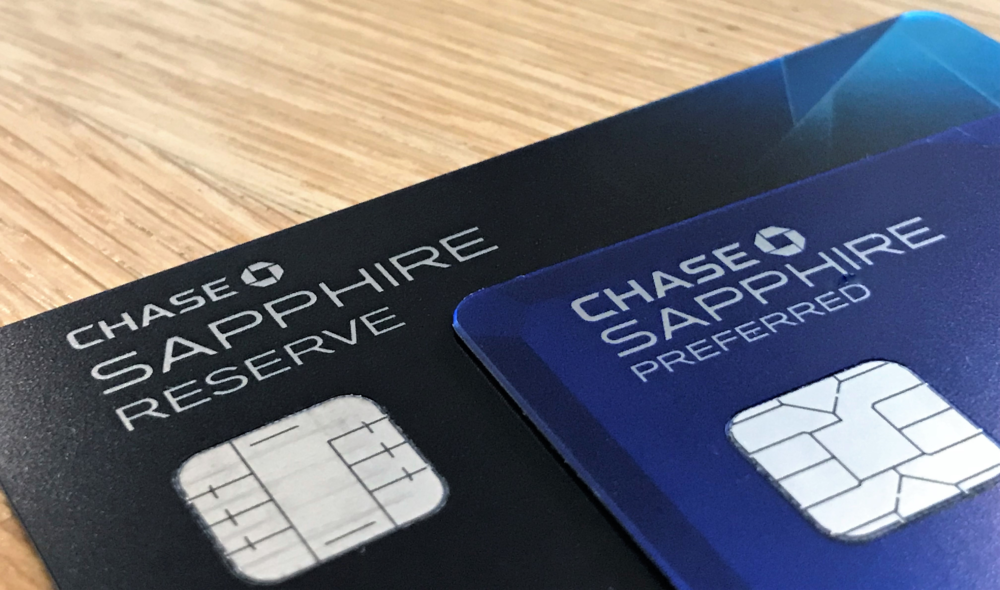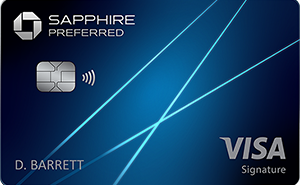Chase’s Sapphire Preferred and Sapphire Reserve cards are popular travel rewards cards that have a lot in common. Both earn Chase Ultimate Rewards points, which are transferrable to multiple hotel and airline partners. Both earn bonus points for travel and dining. Both can use rewards to pay for some travel at better than 1 cent per point value. Both offer excellent travel protections and no foreign transaction fees. Finally, both can make points earned on Chase Freedom cards and select Chase Ink cards more valuable because you can move those “cash back” points to your Sapphire Preferred or Sapphire Reserve card to book travel or transfer points to airline and hotel partners.
Chase recently announced a drastic reboot of the Sapphire Reserve, with a revised earning structure, oodles of new coupon-like credits, and a jaw-dropping $795 annual fee to go with it.
Each card has its pluses and minuses, along with the wildly different annual fees ($795 vs $95). In this post, you’ll find a side-by-side comparison of each card’s benefits, perks, and travel & purchase protections that will appeal (or not appeal) to different people in drastically different ways..
However, before diving into the details of each card, it’s important to mention that the best card for you right now may very well be whichever one offers the better welcome offer. Later, you can always call Chase to ask about changing to the other card after the first year. This is especially salient given that the “new” Sapphire Reserve was just launched with what will undoubtedly be a tempting offer for some folks.

Overview
If there is such a thing as a “classic” credit card, the Chase Sapphire Preferred card is it, and it’s not hyperbole to say that it changed the world of credit card rewards when it was originally launched in 2009. Not only was it novel for having multiple spending category bonuses, but it also offered the ability to earn flexible Chase Ultimate Rewards points, allowing cardholders to transfer earnings to hotel and airline loyalty programs.
However, when the Sapphire Reserve card first debuted several years later, it was clearly a better choice than the Sapphire Preferred for most folks who travel. It sported 3X rewards on travel and dining compared to the Preferred card’s 2X earnings in both categories (at that time). The Sapphire Reserve offered cardholders 1.5 cents per point value towards travel booked through Chase vs. the 1.25 cents per point that the Preferred card provides. The Reserve also had a slew of benefits not available to Preferred cardholders, including a Priority Pass membership.
Initially, the Sapphire Reserve cost $450 per year, but the automatic $300 yearly travel credit that the card comes with made it seem more like a $150 card. In this light, the $95 Sapphire Preferred card didn’t fare well by comparison. After all, with only a net $55 per year extra, you could get better perks, better point earnings, and better value for your points.
Things started changing when Chase increased the Sapphire Reserve annual fee to $550, and now up to $795. The newly revamped Sapphire Reserve is more like a $495 per year card after the $300 rebate, making it substantially more expensive than the Sapphire Preferred. Chase has also increased the Sapphire Preferred card’s dining earning to 3X, equaling what the Reserve card offers. The new Reserve card’s earnings on flights and hotels have been kicked up a notch to 4X, but as part of that change, the travel category is now limited to just those two types of purchases; all other travel earns a paltry 1X.

Sapphire Reserve and Preferred Current Welcome Offers
| Card Offer |
|---|
 ⓘ $1544 1st Yr Value Estimate$300 travel credit valued at $285, $300 StubHub credit ($150 Jan-Jun and again Jul-Dec) valued at $75, $500 Chase The Edit credit (2x per calendar year) valued at $125, $300 Chase Dining credit for dining at Sapphire Reserve Tables restaurants ($150 Jan-Jun and again Jul-Dec) valued at $75 Click to learn about first year value estimates 125K Points ⓘAffiliateThis is an affiliate offer. Frequent Miler may earn a commission if you are approved for this offer 125K after $6K spend in the first 3 months. $795 Annual Fee FM Mini Review: Good all-around card for frequent traveler. Best when paired with no annual fee Chase Freedom Flex, Freedom Unlimited & Chase Ink Cash cards. Click here for our complete card review |
 ⓘ $985 1st Yr Value Estimate$50 prepaid hotel credit valued at $35 Click to learn about first year value estimates 75K Points ⓘAffiliateThis is an affiliate offer. Frequent Miler may earn a commission if you are approved for this offer Earn 75,000 bonus points after spending $5,000 within the first three months from account opening.$95 Annual Fee Recent better offer: Expired 5/14/25: 100K after $5K spend FM Mini Review: Great welcome offer. Unlocks ability to transfer points to hotel & airline partners. Solid option to pair with no annual fee Ultimate Rewards cards such as the Freedom cards, Ink Business Cash, and Ink Business Unlimited. |
If you’re looking for a new card, you should start with the one that offers the best welcome offer. In most cases, you can later product-change from one to the other.
Annual Fee & Statement Credits
| Sapphire Reserve | Sapphire Preferred | |
|---|---|---|
| Annual Fee | $795 | $95 |
| Authorized User Fee | $195 | $0 |
| Annual Travel Rebate | $300 | $50 towards hotels booked through Chase. |
| Credit towards hotels in the Edit (2-night minimum required) | $250 per 6 months | N/A |
| StubHub/viagogo credit | $150 per 6 months | N/A |
| Chase Exclusive Tables Credit | $150 per 6 months | N/A |
The Sapphire Reserve card’s annual $300 travel rebate is easy to maximize each year. It’s hard not to earn it, since all travel purchases made with the card are automatically rebated up to $300 in total. Note that you don’t earn points on that $300 of spend, so the rebate is arguably worth slightly less than $300.
Meanwhile, the Sapphire Preferred $50 hotel rebate isn’t nearly as easy to earn, since it only applies when you book a paid hotel stay through Chase Travel℠. The rates found through the portal may not be nearly as good as what you can obtain through other means, such as with member discounts, AAA discounts, etc. And, finally, when booking hotels through Chase Travel, you can’t earn extra rewards by starting in an online shopping portal.
Chase has also added a whole bunch of coupons to the revised Sapphire Reserve, all broken up into bi-annual chunks: $250 twice per year on bookings through Chase’s luxury hotel collection, The Edit; $150 twice per year at StubHub or viagogo; and $150 twice per year when dining at restaurants that are a part of Chase Exclusive Tables. Note that The Edit credit requires a 2-night minimum booking, and you must pre-pay for your stay.
Ostensibly, these new credits give Sapphire Reserve cardholders an additional $1100 per year in value, and for some folks, it will legitimately provide that amount, particularly if there are lots of restaurants in your area that qualify for the dining credit and/or if you regularly buy event tickets from StubHub. If that’s not you, you’re left with the $250 Edit credits that must be used twice per year on two-night stays.
Because the value of these will vary so drastically from person to person, we’ll refrain from trying to put an exact dollar amount on them. But it’s worth asking, “Would I buy these every year for $495?”
Card Perks
Below, we’ve listed the perks for each card that we think are the most valuable. For complete details about card perks and more, see our guides to the Chase Sapphire Reserve and Chase Sapphire Preferred.
| Sapphire Reserve | Sapphire Preferred | |
|---|---|---|
| Foreign transaction fees |
No | No |
| Transfer points to partners: Transfer points 1 to 1 to a variety of airline and hotel programs | Yes | Yes |
| Point Boosts: When booking travel through Chase Travel℠, points are sometimes worth more than 1 cent each thanks to Point Boosts. |
Up to 2 cents per point | Up to 1.5 cents per point for most travel. Up to 1.75 for premium cabin tickets. |
| Grandfathered point value towards travel: When booking travel through Chase Travel℠, points earned prior to October 26, 2025, are worth more than 1 cent each, but only for cardmembers who applied prior to June 23, 2025. | 1.5 cents per point | 1.25 cents per point |
| Point earnings travel booked through Chase Travel℠ | 8x | 5x |
| Point earnings for other flights and hotels | 4x | 2x |
| Point earnings for other travel spend |
1X | 2X |
| Point earnings for dining spend | 3X | 3X |
| Point earnings for streaming services | 1X | 3X |
| Point earnings for online grocery | 1X | 3X |
| Anniversary point bonus* | N/A | 10% |
| Priority Pass & Chase Sapphire Airport Lounge Access: Free entry for the cardholder and up to two guests. This version does NOT include Priority Pass restaurants. | Yes | N/A |
| Global Entry, TSA Pre✔® or NEXUS Fee Credit: Receive a statement credit of up to $120 every 4 years as reimbursement for the Global Entry, TSA Pre-Check, or NEXUS application fee charged to your card. | Yes | N/A |
| IHG Platinum Status through 12/31/27 | Yes | N/A |
Here again, the benefits of the card diverge even further. There are undoubtedly more benefits with Sapphire Reserve: lounge access, TSA Pre Check credits, IHG Platinum status. However, those are all benefits that I already get with other cards, and the Sapphire Reserve doesn’t provide anything unique outside of entrance to Sapphire Lounges (which are very nice).
In terms of earnings, the Sapphire Preferred currently offers better returns on non-flight/hotel travel, streaming, and online grocery. That last category can be particularly helpful, as many readers have found that you can get 3X by paying in a grocery store using that store’s app. In addition, the Preferred also gives you a 10% points bonus every year that effectively adds a 0.1 multiplier on all purchases.
By comparison, the Reserve wins on direct purchases of air travel and hotels, as well as purchases through Chase Travel…but not much else. It’s a shame that Chase chose to narrow what was previously a very expansive travel category into the same flight and hotels version that almost every “travel” card has. It makes it much harder to think of it as an “all-around travel card.” By comparison, while the Preferred only earns 2x, it earns it on all travel instead of just flights and hotels.
For many cardholders, the biggest reduction in the value of the “new” Reserve as compared to the old will be the nerfed ability to use points to book travel through Chase at a value of 1.5 cents per point. Instead, Chase Travel℠ will offer rotating “points boosts” of up to 2x. All other non-boosted travel redemptions will only provide 1 cent per point in value.
How that compares will depend a lot on the frequency and quality of the points boosts. If they’re widespread, apply to many different types of redemptions that you need, and are usually 1.5X+, it could be a win.
Travel Protections
Both cards offer very good protection for paid travel. However, the Sapphire Reserve is clearly superior:
| Sapphire Reserve | Sapphire Preferred | |
|---|---|---|
| Primary Car Rental Coverage1 | Yes | Yes |
| Roadside Assistance | Free 4 times per year | Requires paying fee for each service |
| Trip Cancellation and Interruption Coverage | Up to $20K per trip | Up to $20K per trip |
| Trip Delay Insurance | 6 hour delay | 12 hour delay |
| Lost Luggage |
Yes | Yes |
| Baggage Delay |
Yes | Yes |
| Travel Accident Insurance | Yes | Yes |
| Emergency Evac & Transport | Up to $100K | N/A |
| Emergency Medical & Dental |
Up to $2,500 | N/A |
- Rental car insurance is not primary for residents of New York State who also have a personal car insurance policy.
Purchase Protections
Here are the highlights of the purchase protections that both cards offer. Again, the Sapphire Reserve is clearly superior:
| Sapphire Reserve | Sapphire Preferred | |
|---|---|---|
| Extended Warranty: Extends the time period of U.S. manufacturer’s warranty by an additional year, on eligible warranties of three years or less. | Yes | Yes |
| Damage, Theft, Loss Protection: Covers your new purchases for 120 days against damage, theft or accidental loss. | Max $10K per claim | Max $500 per claim |
| Return Protection: You can be reimbursed for eligible items that the store won’t take back within 90 days of purchase. | Max $500 per item, $1,000 per year | N/A |
Chase Sapphire Reserve vs Preferred Summary
| Sapphire Reserve | Sapphire Preferred | |
|---|---|---|
| Annual Fee |
$795 | $95 |
| Authorized User Fee |
$195 | $0 |
| Travel Rebate |
$300 | $50 Hotel |
| Credit towards hotels in the Edit (2-night minimum required) | $250 per 6 months | N/A |
| StubHub/viagogo credit | $150 per 6 months | N/A |
| Chase Exclusive Tables Credit | $150 per 6 months | N/A |
| Point Boosts | Up to 2x | Up to 1.75x |
| Point earning for flights/hotels | 4x | 2.1x* |
| Point earning for all other travel |
1X | 2.1X* |
| Point earning for dining | 3x | 3.1x* |
| Point earning for online grocery and streaming services | 1x | 3x |
| Anniversary point bonus* | N/A | 10% |
| Perks | Better | Limited |
| Travel protection |
Best | Good |
| Purchase protection |
Better | Good |
Conclusion
Undoubtedly, many people will decide that the Sapphire Reserve card’s benefits don’t justify the sizable $795 annual fee. However, some will reasonably decide otherwise. The value proposition of the Sapphire Reserve and its myriad credits in many ways bears more resemblance to the American Express Platinum Card® instead of the Sapphire Preferred.
Here are some reasons why it would make sense to choose the Sapphire Reserve over the Sapphire Preferred:
- The credits for The Edit, StubHub, and Chase Exclusive Tables are useful and easy to optimize
- The majority of your travel bookings are for flights, hotels, or through Chase Travel℠
- You value the Sapphire Reserve card’s Priority Pass benefit (and its ability to get you into Chase Sapphire Lounges)
- You value the Sapphire Reserve card’s better travel protections
If those don’t float your boat, and especially if you don’t find the new credits useful, the Sapphire Preferred is still an excellent way to retain transfers to Chase’s travel partners at a pricetag that’s several hundred dollars lower.





Greg,
Not sure if you remember me. I wanted to put closure to a thread you and I had months ago in regards to you stating in a coffee Break video and in one of your posts that if anyone signed up for/or product changed to the Chase Reserve card before the new change launch date, that they would get an additional $300 travel credits at renewal. Well I wanted you to know that this is definitely NOT the case. At least not for me. I feel that It might have been possible,had it not been brought up in your post. Making me believe that there must be people at Chase and AMEX who’ s job title is to read all this stuff that anyone writes about Credit Card and Airline Miles use on the Boarding Area website and if hurry to close any potential “mistake loop holes” that are noticed so nobody can utalized these mistakes.
I am curious though, if you know of anyone who has gotten the double dip of $300 travel credit the card offers for renewing before the changes. But then you might not want to shine the light that someone who did benefit from this. Or maybe you realize that your were just incorrect in your prognostication on this one point.
Not trying to open up an old wound, because you already did your Mea Culpa last time we chatted. I was only reporting back, since you said you were interested in if I got it or not. Unfortunately, I will not get it.
Still enjoy reading your posts and watching coffee bread videos, It’s just now, I’ll proceed with caution before I act.
All the best,
Keith
Thanks for closing the loop on this! Yeah, it looks like I was completely wrong about how that would work. I’m very sorry about that!
For what it’s worth, the trip delay benefit on my new CSP says 6 hours, not 12. Dunno when it changed, but I was surprised to see that.
Thanks for pointing this out. You’re right that if you go to the benefits page for your Sapphire Preferred, it claims that trip delay is 6 hours, but if you download the benefits guide you’ll see that it says 12 hours. So, I believe the benefits page is wrong.
Here’s what’s on the benefits page:
Benefit Overview
If your common carrier travel is delayed more than 6 hours or requires an overnight stay, you are covered for unreimbursed expenses, such as meals and lodging, up to $500 per covered traveler.
And here’s what’s in the benefits guide:
This benefit applies if the Covered Traveler’s Common Carrier is delayed for more than twelve (12) hours or requires an overnight stay. T
Plus when you move to an appartement in Paris you will want all your grocery staples delivered for the 3X. Preferred is the slam dunk winner for Paris Hyatt Globalist!
If you are a Hyatt Globalist fanboy then the extra earnings on the Reserve are meaningless because you are using your Hyatt card to pay your bill. And then grocery puts Preferred over the top and you don’t have to carry that heavy card.
FYI, the IHG Platinum Status through 12/31/27 won’t be available until October for old card holders (like me- old AF and I’m an old man!!!).
Additionally after hitting $75 k additional spend, that can but bumped up to IHG DIAMOND! That spend also adds SWA $500 credit and A List status if I remember correctly. These may be important to some people…
This is probably the best summary of the historical CSR benefits. As someone who got the grandfathered card a day before it changed on June 23rd, it’s been hard to figure out what benefits I’m eligible for beyond the headline ones ($300 TC, 3x Dining/Travel). For example, I’m pretty sure I get a DoorDash monthly credit but not sure about Chase/Opentable Tables or Lyft credits.
Help me out here please. I’m probably going to downgrade to the Preferred.
Thanks
1. Call the number on the back of your card
2. Yes
Thanks!
I could maybe justify the annual fee difference if the points earning was as good. But getting 3x streaming and 3x online grocery (I can pay in app and it codes as online) far more than offsets the 1x difference in travel.
I have other cards with Priority Pass and now that Chase doesn’t cover restaurants, the value proposition, unless you have a Ritz card, comes down to whether you would use a Chase lounge regularly.
Can you explain why a bank headquartered in NYC excludes the primary auto rental coverage for residents of NY? (Its the reason I just cancelled my Reserve after 8 years- plenty of other cards have the secondary rental coverage).
No I can’t explain it but maybe someone else here can?
Is there some state law issue involved?
New York State law provides that your personal policy MUST extend CDW coverage to any auto rented for 30 days or less.
My guess is that Chase wants to avoid a situation where each insurer claims the other is responsible for the first dollar of loss.
Also the NYS exclusion doesn’t apply outside the US or if you don’t have insurance like most NYC residents.
I really love this post and the discussion. One thing I am curious about is if I downgraded to Freedom, applied for preferred, and was declined, how soon could I upgrade back to a CSR?
I’m not certain but I think you could upgrade right away.
Great insights and analysis. I completely agree with where you both landed on your decision. I used to hold the Reserve when it was $450 and when the Preferred had no $50 credit. But now with the Reserve at $550 and me finding it much better to transfer points to partners such as Hyatt rather than redeem the points at 1.25 or 1.5 through the Chase portal, it makes the Preferred the clear choice.
I”ve been on the fence about downgrading my CSR but now with the new lounge open in San Diego (and Phoenix) , I’ll see how many times I take advantage of that Before making a decision.
I just called Chase about downgrading my CSR to a Freedom card. They said that I would have to wait at least one billing cycle to apply for the CSP, and that if later on I want to upgrade to a CSR, I have to wait a year for that. She also said that the travel I have paid with CSR, which is coming up in July, would not be protected by the CSR benefits anymore. I know it is 100K but who knows it it will be available in two months? Decided to keep my CSR.
Reps don’t always give the correct info. If you downgrade, a week should be more than enough time before you apply for the CSP. The referral links are saying to have friends apply by May12th, but some say that could be extended.
Great analysis. I am downgrading.
Chase Sapphire Reserve – a person can pick and choose what works for them from the items below.
$300 Travel Credit
$300 DoorDash Credit ($25/month as noted by Lang)
$200 up to via DoorDash discounts on gift cards
$120 up to Lyft credit ($10/month)
10X versus 5X on a single travel portal booking is worth something
$2000 * 5X extra = 10,000 * 1.25X transfer bonus * 2cpp at the airline = $250
See Miguel’s comment below for an out-of-the-park example.
1.5cpp versus 1.25cpp on a single travel portal redemption is worth something
$500 / 1.5cpp = 33,333 points
$500 / 1.25cpp = 40,000 points
6,666 points * 1.25 transfer bonus * 2cpp at the airline = $167
If the answer comes out to the Sapphire Preferred, then get a Bilt card.
Agree with this. Bilt is a great card with many valuable partners ( better than chase at this point ) with very similar points multipliers as the preferred. I do not do online groceries, and streaming is negligible . Plus one could use the cap one savor for those purchases which is also a $0 AF card. I may dump chase long term and just keep their hotel and airline cards and use bilt.
How do you use the CSR to buy gift cards at Doordash and get refunded for them? thanks.